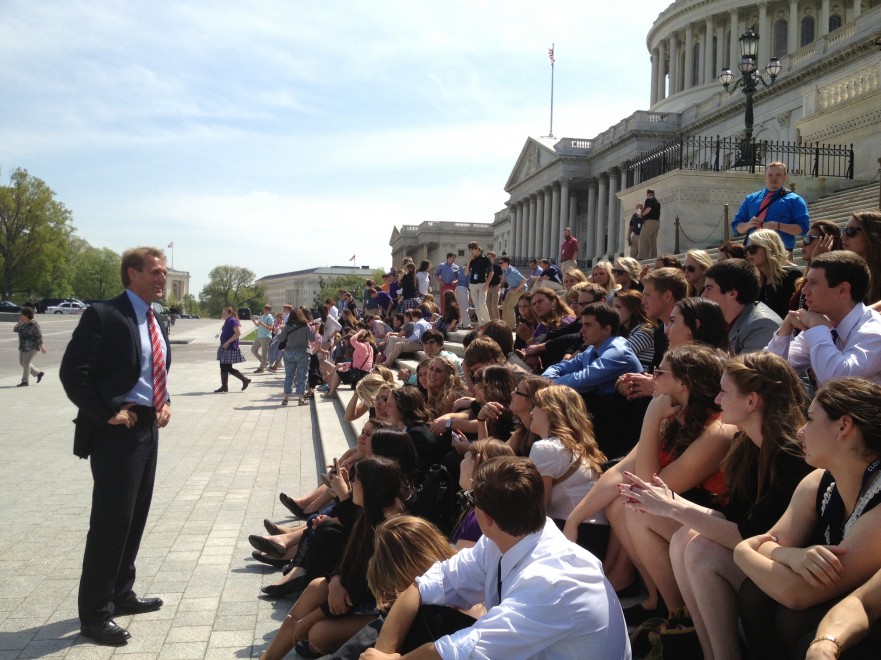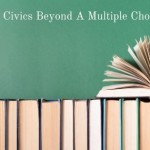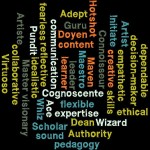I spent almost all of my teaching career as a civics teacher, which is the best job ever. Students in their last year of high school are prepared to take that last social studies class and say goodbye to high school, and just like that they are hooked. They realize that understanding how our government functions, developing ideas about what policies they stand by and seeing themselves as participants in all levels of civic life is actually interesting. I was in the classroom the day after 9/11, with my Arizona students on the steps of the Supreme Court when SB 1070 reached the high court, and through more simulated debates, trials, and deliberations than I can count. And in my 15 years, I learned that students respect their peers, respect their own voices, and respect the Constitution.
So where did it go wrong?
There are people who point to the lack of civic education as part of the problem. While I agree with the statement that one of the reasons we have school is to develop citizens who are capable of their especially important role in a democratic republic, I feel that schools do focus on civics education. And frankly, the behavior that I am seeing spans generations. So while I absolutely feel that social sciences and specifically civics, must make a comeback throughout school systems, not just at the secondary level, the lack of civil discourse and a basic understanding of the Constitution can’t be blamed on the lack of civics education.
Is it our lack of empathy?
There are times I look at my family and every one of us has our face buried in a phone. There are times (many) someone I know calls me, and I think why couldn’t they text? At what point will technology and social media disconnect us from one another? This seems especially important for Americans. We may not be ethnically, culturally, or religiously connected as Americans but we are connected by choice and by union. So when we are buried in our phones, have we fissured the more perfect union that we must actively work to build? And as schools, what role can we play? How do we support young people who stay connected to one another in ways that we have failed?
How can we teach young people to distinguish fact from fiction?
Over ten years ago, a student created a presentation for my class about how news would slowly over time be curated for each of our individual tastes. The news would mean something different to each one of us based on our belief systems. This was right at the rise of Facebook, and he shared how sites like Grokster and Friendster (early file sharing and social networking sites) would morph into sites where people could literally plug into news and ideas just for them. At the time, this sounded fairly far fetched. Ten years later, we are living in a time where my fact is your fiction. This is especially tricky to combat. Schools have focused on sourcing materials, but there is so little trust for mainstream sources that schools can’t stop there. Schools must center student education around history, literature, and science in the early years so that students have a solid knowledge core from which to make decisions about what they read and view with an understanding of the context of that material.
What obligation do we have to schools?
An educated citizenry is critical to a democratic nation. In order to protect our republican form of government, we must have citizens who can participate in civic society, Therefore, we need schools, John Adams stated, “ The whole people must take upon themselves the education of the whole people, and must be willing to bear the expenses of it. There should not be a district of one-mile square, without a school in it, not founded by a charitable individual, but maintained at the public expense of the people themselves.” Schools must be a priority in every community and our obligation is to fund them properly. No school district should be worried about advertising for overrides, they should be focused on educating kids. It is a moral imperative for our nation.
I am hopeful that we can all learn from our young people, who have been so patient and resilient this year. Our nation depends on it.










Comments 3
This piece is so spot on. Your ending is a truly important concept. Schools, even if doing everything well, can be doing better – the proof is in our citizenry. Schools need to evolve and adjust based on our outcomes. However, instead of evolving, we are spending time begging for respect, pleading for funding, and asking for a bit of trust.
It is hard for us to correct a path when we are asked to focus on defense instead!
This is amazing. I couldn’t agree more.
I love this piece! I often feel this push and pull between providing students with experiences that support their civic engagement and this feeling of being seen as someone who is pushing an agenda. What we say and do in our classroom affects our students. The text we read, the videos we share, and the activities we provide help shape our students’ futures. This daunting task often requires us to take risks to help our students see something or someone different from themselves. This can feel scary and uncomfortable, but in order to create a discourse that promotes engagement in our society, we must have a foundational understanding of something beyond ourselves. This is where real progress and change can happen. It takes courage but it also reaps rewards.